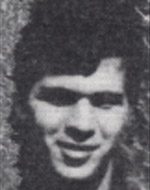Son of Adina and Moshe, was born in Kfar Bialik on August 7, 1960. Alon’s roots are deep in Kfar Bialik. His father, Moshe, was a farmer born in the village and son of parents who came from Germany before the Nazi rise, out of Zionist recognition and foresight. When they immigrated to Israel, they went through a course of agricultural training at Mikve Israel and Nahalal, and set out to establish Kfar Bialik in the 1930’s, and their livelihood on agriculture. Their son Moshe continued his studies, like his father, in Mikve Israel, in order to become a farmer. And Alon – his great love was agriculture. He aspired to study at the Faculty of Agriculture in Rehovot, in order to expand his horizons in various fields and to establish with his friends a new agricultural settlement. Alon studied at an elementary school in Kfar Bialik and continued to study at the ORT school in a theoretical track. At school he showed a tendency to mathematics, and even when he did not prepare the exercises in advance, he knew how to solve them immediately. Along with his studies, Alon was interested in many different fields. He liked the landscape around him, and walked a lot. He was 10 years old when he was walking alone in Jerusalem, while he was with his aunt. He also rode horseback riding with his friends from his village to the Sea of Galilee, absorbing the views of the landscape day and night. On Saturday vacations from the army, Alon chose a route for his trip with his friends, and it was important to him that it be a Yaffa route, and that he would also have the challenge of navigating and walking. Alon was strong, energetic, agile in every action he performed, strong and physically fit. Sports was his favorite. He played handball and basketball and even excelled in them. In the sport he was stubborn and stuck to his goal until victory. His room is full of medals and trophies that testify to his achievements. At the ORT school, Alon was an outstanding handball player who played on the school team. His agility and physical fitness were evident even when he got into work in his parents’ farm; he worked faster than his friends and always ended up before them. Alon did not talk much. His actions were what characterized him. The hands were of a moshavnik – black and rough from picking pans; “Tires” were called by his friends. He was a member of the Mahanot Ha’olim movement. There, too, he was not a talker, but he turned out to be a leader when he had to organize games and trips. Alon did not boast of his successes; the trophies and prizes in his room were not displayed. His friends saw him as a loyal, modest, simple, honest man. He fought for his principles even with his teachers, and even when he was punished for his war, he did not regret the price he paid, if he was sure of his justice. Alon joined the army and asked to make a maximum contribution. He volunteered to serve in the paratroopers’ unit in the Sayeret unit, but he did not tell about it, as he always did. He was accepted into the squadron after careful screening, and after passing physical fitness tests and social adjustment tests. His qualities from childhood were also evident here. He performed every role in the most fundamental way and fought to improve things that seemed ineffective or defective. In the reconnaissance unit Alon became an officer. He trained novices, who came from different ranches in society, to be skilled scouts. He had invested all his might in his subordinates and they knew how to appreciate it. To achieve his goal, he used to talk to them, explain them, and convince them. Eli Turgeman, a trainee, writes that Alon determined his opinion of a soldier not according to his ability as a soldier, but according to his character and values as a person. He was a personal example of his apprentices: when he confined them to the camp, he remained in confinement with them. He devoted himself to the personal treatment of every soldier, and therefore achieved high achievements from every soldier. Even as a commander, Alon did not speak much. He spared compliments, and therefore a compliment that came out of his mouth was the most precious reality and gave a feeling of deep satisfaction to his soldiers. As a commander he was firm and brave. Alon led the journeys, patiently demonstrating the exercises again and againAnd demanded high-level execution. His friends from the period of November 1978 say that they tried to emulate him, because they had an example of his integrity, his simplicity and his physical and mental strength. He also knew how to forgive and understand, and therefore found it hard to punish, and when he did, he did with a heavy Lev. Ami 4: “Alon was the main part of the track, and he was the educator, the example, the aspiration, the Lev of the team.” In a letter to the family, his commander wrote that he “carried out all his missions faithfully and meticulously until the very last moment, and was an example of integrity, willpower, trust and devotion to the cause. And to the people of Israel as a whole. “Lt. Col. Alon fell in battle in Lebanon during the Peace for Galilee War, during an exchange of fire between our forces and a Syrian force in the village of Einav, while he was commanding his team on the first line of fire. Forever in the military cemetery in Haifa. Alon placed mountains and two brothers. His parents and friends published a pamphlet in his memory.
